Guys doing stuff. Films reviewed: Nobody, Six Minutes to Midnight, Judas and the Black Messiah
Hi, this is Daniel Garber at the Movies for culturalmining.com and CIUT 89.5 FM.
A few weeks ago. I did International Women’s Day, so this week I’m looking at three new movies about guys doing stuff. There’s a WWII drama about a spy in a school for Nazi girls, a ‘60s drama about an FBI rat in the Black Panther Party, and an action-thriller about an ordinary, middle-aged man who decides to fight against the Mafia.
Dir: Ilya Naishuller
Hutch (Bob Odenkirk) is a ordinary guy who lives in the suburbs with his wife and two kids. He works at a dull desk job in a nondescript factory, a life that, while not perfect, is what he wants. But when his house in broken into by a pair of amateur burglars., everything falls apart. His his son no longer respects him and his wife seems bored by his very existence. She married a wimp. Something has got to change. So Hutch sets out to channel his anger and aggression.
He gets his chance when a pack of hoods boards a city bus and begin harassing and threatening a teenaged girl. So he decides to pick a fight. They’re younger, stronger and meaner than he is, and there’s six of them. Is there something about Hutch we don’t know? The good news is he beats all six to a pulp, sending them to hospital. The bad news is one of them dies. Worse news is he’s the younger brothers of a notoriously powerful Russian mob boss named Yulian (Aleksey Serebryakov). Yulian is cruel, sadistic and vengeful, with a  veritable army of supporters. Can Hutch face down an entire Russian mob? Or is he, and his family, doomed to die?
veritable army of supporters. Can Hutch face down an entire Russian mob? Or is he, and his family, doomed to die?
Nobody is a great action thriller, extremely violent but quite entertaining. There are car chases and excellent fight scenes — many without guns — and a pace that is constantly moving. You might know Odinkirk from the Breaking Bad spin-off Better Call Saul, not your average action hero, but he pulls it off perfectly. And Serebryakov as the villain  is also fascinating — he’s actually a famous Russian actor, in movies like Leviathan. Also Christopher Lloyd as an elderly action hero, and RZA, of Wu Tang fame, rounding out the slate. This is actually a Russian movie (though it’s mainly in English and shot in Winnipeg) and the director, Ilya Naishuller, does really cool stuff with his camera, eliding entire days into just a few seconds on the screen. I like the look and feel and mood and music he uses. There’s nothing deep or socially relevant or meaningful about this film, it’s just a fun and exciting action movie about fights, explosions, guns and cars, skillfully done.
is also fascinating — he’s actually a famous Russian actor, in movies like Leviathan. Also Christopher Lloyd as an elderly action hero, and RZA, of Wu Tang fame, rounding out the slate. This is actually a Russian movie (though it’s mainly in English and shot in Winnipeg) and the director, Ilya Naishuller, does really cool stuff with his camera, eliding entire days into just a few seconds on the screen. I like the look and feel and mood and music he uses. There’s nothing deep or socially relevant or meaningful about this film, it’s just a fun and exciting action movie about fights, explosions, guns and cars, skillfully done.
Dir: Andy Goddard
It’s the summer of 1939 in Bexhill-on-Sea, a small coastal town in southeastern England. The girls at Augusta-Victoria College, a prestigious boarding school, are out for their morning swim. They’re excited because a new English teacher is coming that day. The school is run by a stern headmistress (Judi Dench) who is adamant about teaching girls poise, grace and maybe a bit of knowledge. And while she’s suspicious of the new “gentleman teacher” Thomas Miller (Eddie Izzard), she likes the fact he plays the piano. And the girls — including Ilsa (Carla Juri), their leader, Astrid the rebel, and Gretel the bullied girl with glasses — all enjoy singing in class. But what’s so special about this 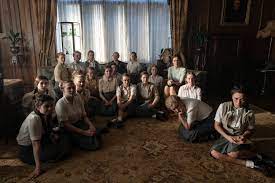 school? All the young women there are Germans. And not just ordinary Germans, but the daughters and granddaughters of the Nazi elite.
school? All the young women there are Germans. And not just ordinary Germans, but the daughters and granddaughters of the Nazi elite.
Mr Miller knows all about this before he arrives. He’s a British spy on a secret mission: to find out what’s going on behind closed doors. But when his handler, a Colonel, is assassinated before his very eyes, things get dangerous. He’s blamed for the killing, labeled a German spy, and has no way to contact headquarters to clear his name. Meanwhile, German sympathizers are everywhere — who can he trust? Europe is on the brink of war, and something major is about to happen to the girls in the  academy. Can Miller free himself, save the girls, and stop the German war effort? Or is he doomed to failure?
academy. Can Miller free himself, save the girls, and stop the German war effort? Or is he doomed to failure?
Six Minutes to Midnight is an enjoyable WWII thriller. It’s filled with classic skullduggery, like hidden cameras, double crossers and political intrigue. Eddie Izzard and Judi Dench are good, along with James D’Arcy as a police captain, Jim Broadbent as a bus driver, plus a bevy of talented German and Swiss actresses.
I guess I’m a sucker for British historical dramas, but… they do them so well!
Dir: Shaka King
It’s the summer of ’68 in Chicago. Fred Hampton (Daniel Kaluuya) is the young local head of the Black Panther Party. They supply meals for poor kids and plan to open a medical centre. He takes up with Deborah (Dominique Fishback) a young idealistic poet. Fred is also known for his rabble-rousing speeches, done without a mic, calling for revolution, instead of just posturing: Political power doesn’t flow from the sleeve of a dashiki, he says. You have to do something, don’t just talk about it. Because 1968 is a time of change, with the war in Vietnam, the Democratic convention, and massive marches and demos going on in downtown Chicago.
Naturally, J Edgar Hoover and the FBI don’t like it at all. They label the Panthers “dangerous extremists” and decide to go all out to stop them, with their notorious and illegal operation known as  COINTELPRO. They plan to infiltrate, jail or kill the Panthers, whom they call a subversive criminal group.
COINTELPRO. They plan to infiltrate, jail or kill the Panthers, whom they call a subversive criminal group.
Meanwhile, there’s Wild Bill O’Neal (LaKeith Stanfield) a petty grifter and car thief who poses as an FBI agent to rob other blacks. He’s caught, threatened with prison or worse, and forced to work as a rat for the FBI. It’s a carrot and stick operation. His handler, Roy Mitchell (Jesse Plemons), possibly  the whitest guy in the world, shares the wealth — cigars, expensive alcohol, and envelopes of cash. He just has to betray the panthers, incite violence, and draw maps of their headquarters for illegal break-ins and assassinations.
the whitest guy in the world, shares the wealth — cigars, expensive alcohol, and envelopes of cash. He just has to betray the panthers, incite violence, and draw maps of their headquarters for illegal break-ins and assassinations.
Judas and the Black Messiah is a fantastic historical dramatic thriller about major social movements and the the US government’s attempt to stop it. The title suggests it’s about two clashing forces, Hampton and O’Neal, the revolutionary and the traitor, facing off. But actually they seldom interact. It’s actually a story divided into two points of view, the FBI, and the Black Panther Party. It’s full of stuff I hadn’t heard about — things like Hampton organizing working-class whites, Puerto Ricans and Blacks in order to form a united front based on class, not race. Kaluuya and Stanfield were in the movie Get Out together and they’re both unrecognizable; they totally get into their roles here. It’s an important issue told in a cinematic way… and it’s nominated for for academy awards this year.
Great movie.
Nobody and Six Minutes to Midnight are available starting today, and Judas and the Black Messiah is coming soon.
This is Daniel Garber at the Movies, each Friday morning, on CIUT 89.5 FM and on my website, culturalmining.com
O Canada! Films reviewed: Jump Darling, Underplayed, Death of a Ladies’ Man
Hi, this is Daniel Garber at the Movies for culturalmining.com and CIUT 89.5 FM.
There are tons of great movies finally opening up this week, including Night of the Kings which I reviewed last fall, one of my favourite movies of the year, at the digital TIFF Bell Lightbox.
This week I’m looking at three new Canadian movies ready to be seen There are female DJs who want to be noticed, a Toronto drag queen who who wants to see his grandmother, and a Montreal poet who wonders why he keeps seeing his dead father.
Wri/Dir: Phil Connell
Russell (Thomas Duplessie) is an aspiring actor whose career is going nowhere. His only role? As Fishy Falters, a drag queen gig he landed at a Toronto gay bar called Peckers. And even that falls apart when he trips on his way to the stage in a symphony of disaster. His husband, a successful Bay Street lawyer who bankrolls his acting career, rubs salt in the wound: take some acting courses or go to. auditions, but no more drag, it embarrasses me.
Russell takes this as an ultimatum, packs up a suitcase and heads out the door. He lands up at his grandmother’s place in Prince Edward County to borrow her car os he can drive off to unknown parts.. She greets him at the door with a scream and a knife. Margaret (Cloris Leachman) lives alone. She was once a figure skater (I was hired by the Ice Capades! she says) and a formidable bridge player, but since her husband died she’s been frail, forgetful and depressed. Russel’s mom (Linda Kash) wants to send her off to an old-age home, but Margaret would rather die. So Russel agrees to stick around and help take care of her. Meanwhile he starts frequenting a tiny bar in town, where he thinks his drag act could catch on. Will he pull Margaret out of the dumps? And will hr return to Toronto, triumphant?
help take care of her. Meanwhile he starts frequenting a tiny bar in town, where he thinks his drag act could catch on. Will he pull Margaret out of the dumps? And will hr return to Toronto, triumphant?
Jump, Darling is a bittersweet family drama about a young gay man trying to express himself in the inly way he knows, and an elderly woman dealing with old age and loss. (The title Jump Darling refers to her husband’s suicide) This is a first time feature both for the director and Thomas Duplessie as Russell, and they pull it off quite nicely. The characters are three-dimensional not cookie-cutter. Of course it helps having the late, great Cloris Leachman in her final role, and Linda Kash who ties the two sides firmly together. This is a good movie.
Dir: Stacey Lee
The music business is vast and diverse, but not equitable. Did you know that of Billboard’s top 100 DJs, only 7 are women? Same holds true in the electronic music sector, even fewer studio producers are women. And only a tiny fraction of these are women of colour. Why are there so few and why don’t we ever hear about them? This documentary looks at the industry and its history, and follows a handful of female DJs, electronic musicians and producers as they play their music in clubs, concerts and festivals over the course one summer.
Many trailblazers in electronica — from Wendy Carlos to Daphne Oram — were women, but names like Moog dominate the collective memory. And in the electronic DJ world, at raves and festivals, women find it nearly impossible to get their proverbial feet in the door.  The filmmakers talk to stars like Tokimonsta, musician Alison Wonderland, Toronto-based superstar Rezz, and newcomers like Tygapaw out of Brooklyn. The documentary shows both their professional lives — at concerts and in studios — and also gives them a soapbox to talk about the troubles they face on the road and in the workplace. Underplayed is an informative look at under-representation and equity in the electronic music world, with some cool digital graphics and great beats playing in the background.
The filmmakers talk to stars like Tokimonsta, musician Alison Wonderland, Toronto-based superstar Rezz, and newcomers like Tygapaw out of Brooklyn. The documentary shows both their professional lives — at concerts and in studios — and also gives them a soapbox to talk about the troubles they face on the road and in the workplace. Underplayed is an informative look at under-representation and equity in the electronic music world, with some cool digital graphics and great beats playing in the background.
Wri/Dir: Matthew Bissonnette
Samuel O’Shea (Gabriel Byrne) is a Canadian poetry prof at McGill and a notorious philanderer. He sees his ex-wife Geneviève (Suzanne Clément) at Thanksgiving and Christmas along with his adult children. Josée (Karelle Tremblay) is a foul-mouthed artist who hangs out with a junkie, and his son Layton (Antoine Olivier Pilon) is a brawler for a minor league hockey team who is also gay. He meets them each once a week for lunch. But his life is falling apart. He drinks heavily and his creative output — he’s a writer — is zero. And when he catches his second wife in bed with another man, he is deeply offended — How dare she… he’s the adulterer, not her! But that’s not all.
His father (Brian Gleeson) is frequently visiting him at home. Problem is, he died in Ireland decades  ago when Samuel was just a boy. Other hallucinations come and go: a female bodybuilder with a tiger’s head, and the grim reaper himself. Is he going crazy? Turns out Samuel has an inoperable tumour pressing on his brain. So he decides to turn his life around. He packs up and heads to Ireland, to write his novel. There he meets Charlotte (Jessica Paré) a Quebecoise former model who works in a corner. Is third time the charm? Will he beat his tumour? Will he ever stop boozing? And will he reconcile with the ones he loves?
ago when Samuel was just a boy. Other hallucinations come and go: a female bodybuilder with a tiger’s head, and the grim reaper himself. Is he going crazy? Turns out Samuel has an inoperable tumour pressing on his brain. So he decides to turn his life around. He packs up and heads to Ireland, to write his novel. There he meets Charlotte (Jessica Paré) a Quebecoise former model who works in a corner. Is third time the charm? Will he beat his tumour? Will he ever stop boozing? And will he reconcile with the ones he loves?
Death of a Ladies Man, is a densely-packed, mood-heavy saga about an Irish-Canadian man in his sixties dealing with his life.  Although it’s set in present day Montreal and Ireland, the movie has a very nostalgic feel, and it’s brimming with Canadiana.. The title comes from a Leonard Cohen song, whose music appears throughout the film. Samuel feels like equal parts Duddy Kravitz and Ginger Coffey, a Montreal everyman… all grown up. His son is named Layton (Irving Layton was Leonard Cohen’s poetry mentor.) When he leaves Canada the soundtrack instantly switches to Un Canadien Errant. He hallucinates figure-skating hockey players and fur trappers… Could he possibly be any more Canadian?
Although it’s set in present day Montreal and Ireland, the movie has a very nostalgic feel, and it’s brimming with Canadiana.. The title comes from a Leonard Cohen song, whose music appears throughout the film. Samuel feels like equal parts Duddy Kravitz and Ginger Coffey, a Montreal everyman… all grown up. His son is named Layton (Irving Layton was Leonard Cohen’s poetry mentor.) When he leaves Canada the soundtrack instantly switches to Un Canadien Errant. He hallucinates figure-skating hockey players and fur trappers… Could he possibly be any more Canadian?
The movie — a Canadian-Irish co-production — runs into trouble with all the “meta” elements: it’s hard to tell whether you’re watching the character’s hallucinations, the plot of the book he’s writing, or the writer-director’s own fantasies. Everything centres on Samuel, and though Gabriel Byrne (who is great) is surrounded by some of Quebec’s best actors, they’re all only background figures.
Does it work? I think it does — it’s delightful to watch, wonderfully photographed and redolent with great Canadian music — just don’t mistake art for reality.
Underplayed and Jump, Darling are now playing, and Death of a Ladies’ Man opens today.
This is Daniel Garber at the Movies, each Friday morning, on CIUT 89.5 FM and on my website, culturalmining.com
Daniel Garber talks with Rebecca Snow about Pandora’s Box
 Hi, this is Daniel Garber at the Movies for culturalmining.com and CIUT 89.5 FM.
Hi, this is Daniel Garber at the Movies for culturalmining.com and CIUT 89.5 FM.
It’s as old as humanity, directly experienced by more than half the population, and indirectly by the rest; is crucial to our existence as a species. And yet it’s treated as a dirty and shameful taboo. It’s omnipresent yet never mentioned in public.
I’m talking about menstruation. And because we never talk  about it, women and girls suffer social discrimination and economic hardship, at work and at home, in schools and in prisons. Isn’t it time we open this Pandora’s Box?
about it, women and girls suffer social discrimination and economic hardship, at work and at home, in schools and in prisons. Isn’t it time we open this Pandora’s Box?
Pandora’s Box: Lifting the Lid on Menstruation is a new documentary that delves into its history and culture, and looks at human rights advocates around the world — in India, Kenya, North America and Europe — who are trying to normalize periods and to make them affordable, safe and accessible. It’s written and directed by Rebecca Snow, an award-winning Canadian filmmaker who specializes in social issue documentaries.
Pandora’s Box premiers on Monday, March 8th, International Women’s Day.
I spoke with Rebecca Snow in Toronto, via ZOOM. (Some of the dialogue is inaudible, due to technical difficulties.)
International Women’s Day! Films reviewed: True Mothers, The World to Come, My Salinger Year
Monday is International Women’s Day, so this week I’m looking at three new movies that celebrate women. There’s a woman who encounters her adopted son’s birth mother; an aspiring writer in 1990s Manhattan; and two women in 19th century, upstate New York.
Wri/Dir: Naomi Kawase
Satoko (Hiromi Nagasaku) is a married professional woman in Western Japan. She and her husband enjoy their kids-free lifestyle — fine dining, travel, and a high-rise luxury condo. But they long for a family of their own, and so far, it isn’t working., despite various medical interventions. Then one day on a talk show they see a woman telling about her organization. It’s called Baby Baton because the infant is passed on like a baton from the birth mother to its new parents. Adoptees have to pass rigorous requirements, including that one parent must quit their job and become a full-time house parent. Unsurprisingly, Satoko takes that role. And they bring home the newborn baby of a 14-year-old junior high girl named Hikari (Aju Makita). That was five  years ago. Now they are devoted to their adorable adopted son, Asato. But their world is turned upside down by a knock on the door by a woman who claims to be the boy’s mother. And, she says, she wants him back.
years ago. Now they are devoted to their adorable adopted son, Asato. But their world is turned upside down by a knock on the door by a woman who claims to be the boy’s mother. And, she says, she wants him back.
True Mothers is a touching intimate story of two women’s lives. The movie is divided in half, The first part is all about Satoko and her husband and son, the trials and tribulations of raising a child. The second half is about Hikari the birth mother, and her life since giving up the baby. It explores her time on a misty remote island off Hiroshima (at the Baby Baton headquarters), where she spends the final months of her pregnancy, but also the dark turn her life takes afterwards. Naomi Kawase is one of very few female directors in Japan, and as in all her movies, the story is gently told but full of pathos. Well-acted and very moving with lovely cinematography, True Mothers pulls no punches when dealing with the reality of fertility, unplanned pregnancy, and the other side of adoption.
Very nice movie.
Dir: Mona Fastvold
It’s the 1850s in rural upstate New York. Abigail (Katherine Waterston) is a morose young woman with a stern demeanour and long black hair. She lives in a farmhouse with her husband Dyer (Casey Affleck). They have a flock of sheep, chickens and milk cows. They used to have a little daughter, the light of their lives, but she died before she was five. Since then, it’s been a loveless marriage and the two barely speak to each other, just coasting through life without a purpose. Dyer records financial records in his ledger, while Abigail writes her thoughts and observations in a black-bound diary. But everything changes when they meet their new neighbours who rent a farm over the hill. Tallie (Vanessa Kirby) has ginger hair and fiery eyes, and she swooshes past in elegant gowns. Her husband Finney (Christopher Abbott) has a dark side carrying bitter grudged just waiting to explode. Abigail and Tallie become instant friends, sharing thoughts, sharp observations, secrets. Their husbands notice the change — why are they smiling? Why are they so  happy? Could these two friends like each other more than their husbands?
happy? Could these two friends like each other more than their husbands?
The World to Come is a passionate and poetic romance, about two women who find love along the harsh frontier. It’s narrated by Abigail’s diary entries and love letters from Jan to July of the same year, and the story is told in a literary style, like the turning pages of a book. But it’s not all talk, it’s a beautifully shot movie full of burnished wood, wrought iron, fireplaces, cotton dresses and candlelight. It’s filmed on location, with harsh winter blizzards and beautiful spring days. And while not explicit, there are sensuous scenes of Abigail and Tallie kissing furtively in dark doorways, or sneaking off into the woods. Very famous cast: Vanessa Kirby plays Princes Margaret in The Crown, and Katherine Waterston is in Fantastic Beasts and Inherent Vice. And the husbands, Christopher Abbot and Casey Affleck, are very well known, as well. While I wasn’t deeply moved by this movie, I did care about what happens to the characters, and the film itself is visually very nice to look at.
Wri/Dir: Phillippe Falardeau (Based on the Memoir by Joanna Rackoff)
It’s the 1990s in Manhattan. Joanna (Margaret Qualley) is a young grad student and aspiring poet, who is visiting the city to experience literary New York. She has a boyfriend back in Berkeley, but in the meantime she’s camping out in her best friend Jenny’s cramped Village apartment. Her “room” is a tiny space in the corner separated by a folding paper screen. And she lands a plumb job; not as a a writer or working for a publisher, but in the office of a venerable agency. The company is headed by Margaret (Sigourney Weaver) who looks like a stately Susan Sontag. Margaret’s biggest client is  JD Salinger, author of Catcher in the Rye and Franny and Zooey, whom she calls Jerry. He hasn’t published anything since the ’60s, but he’s still wildly popular. As Margaret’s assistant, Joanna’s main job is dealing with the bags of fan mail delivered each day. Salinger is a recluse, and never sees any mail — they shred each letter, but not before reading it, and sending out a hand-typed — we’re talking typewriters here, no computers allowed in the office — form letter, saying thank try for your kind letter, unfortunately JD Salinger won’t see it.
JD Salinger, author of Catcher in the Rye and Franny and Zooey, whom she calls Jerry. He hasn’t published anything since the ’60s, but he’s still wildly popular. As Margaret’s assistant, Joanna’s main job is dealing with the bags of fan mail delivered each day. Salinger is a recluse, and never sees any mail — they shred each letter, but not before reading it, and sending out a hand-typed — we’re talking typewriters here, no computers allowed in the office — form letter, saying thank try for your kind letter, unfortunately JD Salinger won’t see it.
Meanwhile Joanna is luxuriating in the literary life: having lunch at the Waldorf, rubbing shoulders with famous authors (though never Salinger). She goes to poetry readings at the right cafes and moves in with her handsome new boyfriend Don (Douglas  Booth), a working-calls writer who’s also a bit of a dick. Will Joanna stay on in Manhattan or return to California? Can she forge a career as a literary agent? And will she ever meet Salinger?
Booth), a working-calls writer who’s also a bit of a dick. Will Joanna stay on in Manhattan or return to California? Can she forge a career as a literary agent? And will she ever meet Salinger?
My Salinger Year is a true memoir based on the writer’s own early career. It’s delightful to watch —who would have guessed we could feel nostalgic for the 90s? She experiences the city, wandering into places like the New Yorker magazine’s offices. And it’s full of wonderful vignettes about the quirky people she meets in her office (played by Colm Feore, and others.) It also shows us the writers of the fan mail, each of whom addresses the audience directly, reciting the texts of their letters. The film 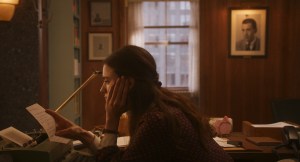 is made by Quebec director Philippe Falardeau (Monsieur Lazhar) and is shot around Montreal. As always, his movies are full of warm, funny characters and lots of detail; he doesn’t gloss over what’s going on. Falardeau also has some weird trademarks — characters break into music videos or start dancing — which I don’t quite get, but luckily it doesn’t detract from the story. You can tell Sigourney Weaver and Margaret Qualley loved making this movie, and if you’re into writing or reading books, or the whole literary milieu, you’ll enjoy it, too.
is made by Quebec director Philippe Falardeau (Monsieur Lazhar) and is shot around Montreal. As always, his movies are full of warm, funny characters and lots of detail; he doesn’t gloss over what’s going on. Falardeau also has some weird trademarks — characters break into music videos or start dancing — which I don’t quite get, but luckily it doesn’t detract from the story. You can tell Sigourney Weaver and Margaret Qualley loved making this movie, and if you’re into writing or reading books, or the whole literary milieu, you’ll enjoy it, too.
True Mothers, The World to Come, and My Salinger Year are all playing today on VOD or streaming sites.
This is Daniel Garber at the Movies, each Friday morning, on CIUT 89.5 FM and on my website, culturalmining.com

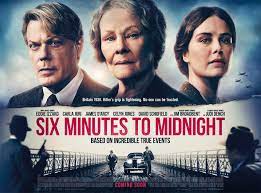
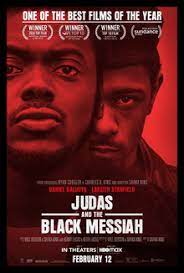

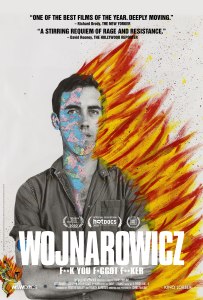




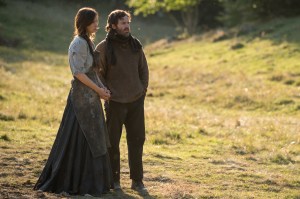

leave a comment